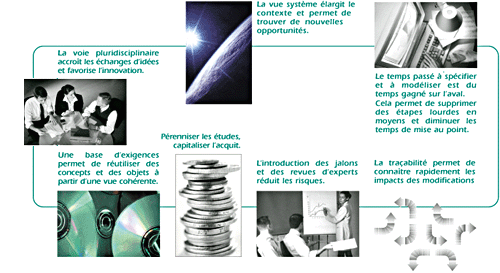 A little history:
A little history:
Engineering of complex systems is rooted in the sixties with the conquest of space through the APOLLO program and other American military programs that required the contributions of many academic and industrial disciplines.
In the intervening years leading up to the nineties, the importance of data processing to control complex systems, combined with rapid advances in the field of computing, caused a shift of emphasis from systems to software engineering.
Systems Engineering has been revitalized by the recognition of technical and economical failures in a series of events such as inefficiency of command & control systems during recent wars, loss of satellites, shuttles and rockets crashes, Channel tunnel from UK to France, computerization of the service industry and government departments which highlighted defects whose origin is systemic: poorly expressed needs, fuzzy requirements, unjustified or non-validated solutions, confusion of responsibilities between the roles of acquirer and supplier related to project management.
The International Council On Systems Engineering (INCOSE ) began in 1991 to encourage research and the exchange of good practices for Systems Engineering. Today systems require the interaction of many disciplines within an international context.
With the contributions of standardization concerning the creation of complex systems from organizations such as IEEE *, EIA * and ISO * at the end of years 1990, industries began to get exploitable documents, processes, methods and effective tools at their disposal. End 2012 a first version (1.0) of the guide to the Systems Engineering Body of Knowledge (SEBoK) is available for public on Internet www.sebokwiki.org.
The implementation of Systems Engineering principles allows industries to face significant technical and economical challenges.
Systems Engineering for Innovating Enterprises
Systems Engineering approach is a powerful means for innovation and optimization.
Systems Engineering integrates multiple disciplines throughout a system life cycle to develop an economical and efficient solution satisfying the requirements of every stakeholder (customer, users, government, manufacturers, project).
The customer viewpoint is generally focused on a balance between the efficacy and affordability of the solution for all the aspects of the problem in all the situations of the system life.
From the designer viewpoint, Systems Engineering provides an approach to balance between requirements, constraints, effectiveness, costs, deadlines and risks.
 Work efficiently with cooperation,
Work efficiently with cooperation,
Reduce development time,
Control deadlines, budget and quality of projects,
Improve quality of products.
